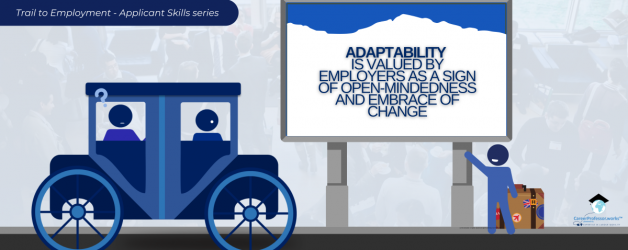Trail To Employment – Applicant Skills Series
Adaptability – the ability and willingness to adjust to new, changing circumstances – is a crucial skill for an ever-evolving job market. According to the CICan Innovation Fund Project Report, employers value graduates’ confidence to step out of their comfort zone and take risks. Being adaptable also means being eager to learn new skills, and flexible in re-integrating those skills into a new work environment. You can demonstrate adaptability first as awareness of a project’s outcome and subsequently by developing a tactic to deal with concerns that show up during the project. Adaptable graduates can flourish in an always-changing work environment (and be aware, since the pandemic change has become more of a constant than ever before).
The Erasmus Competence Booklet showcases that employers are looking for people who are not scared of change and the uncertainty that ensues. Enthusiasm to embrace change is seen as a sign of genuine curiosity, as well as self-awareness. Recognising and admitting your qualities and flaws shows you are keen to accept and incorporate feedback into bettering yourself. Most importantly, being adaptable and responding positively to change gives you the drive to identify what is a priority in a new setup.
What makes you as an internationally mobile student critically more adaptable, according to the Erasmus Competence Booklet, is that adaptability was a prerequisite during your exchange: For understanding and feeling a sense of belonging within a new country, academic environment and social circle. As an Erasmus alumnus said, “When you go abroad for an exchange, adaptability is not a choice but a necessity; you need to adapt and get out of your comfort zone.” Adaptability skills quicken your exploration of a new situation, which is deemed necessary in sudden changes – such as those presented during the pandemic – but also in fundamental changes – such as the culture or legislation of a company’s department.
The different levels of change you will face upon entrance to the host country of your study are multiple. New living conditions and teaching methods critically impact your feeling of comfort or discomfort in a foreign environment. For instance, to navigate a new city’s transportation system you initially have to ask people questions about it; soon you develop a sense of direction and orientation as well. What is commonly referred to as adaptation problems – such as learning a new language or making new friends – is the gist of it. Adaptation problems cultivate a growth mindset, effectively preparing graduates for the job market. In other words, adaptation challenges harvest adaptation tactics; only by facing setbacks, either in your academic performance or getting used to cultural norms, will you get an incentive to accomplish your goals and cultivate resilience.
Communication; Adaptability; Problem-solving; Teamwork; and Time- and Self-management are the top skills employers seek. These skills surfaced in the employer interviews conducted by Expertise in Labour Mobility (ELM) within the CICan Innovation Fund Project. This blog series called Trail to Employment – Applicant Skills presents each of their respective functions using the metaphor of a carriage, the vehicle needed on the trail to employment. In doing so, we direct students considering going to an exchange or approaching graduation on their path to the job market. The series concludes with a post proposing different ways you can convincingly argue how your international experience contributed to the acquisition and cultivation of those skills.
In summary, Adaptability is valued by employers as a sign of open-mindedness and embrace of change. Within the carriage, adaptability skills are the horses, well-trained to guide the carriage and get the passengers to their destination (your dream career). If you want to learn more about skills, click on the next post!
Written by Athina Tzanetou for Expertise in Labour Mobility
Images by Jizelle Ys for CareerProfessor.works
© 2024 CareerProfessor.works. All Rights Reserved.






